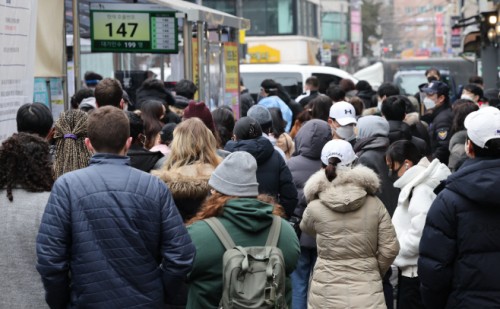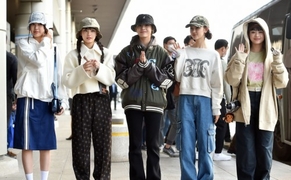 |
| People wait in line to receive tests at a COVID-19 testing station in Seoul on Feb. 19, 2022./ Source: Yonhap |
AsiaToday reporter Park Ah-ram
South Korea reported more than 100,000 new COVID-19 cases over the weekend as the omicron variant raged across the country.
Health experts are concerned that the government’s eased business hour curfews may give out wrong message to the public that the current situation is not grave when it is unclear when the country would reach the pinnacle of the omicron wave. On the other hand, the government’s decision brought a strong backlash from small merchants and self-employed people who expected a significant easing of social distancing measures.
The government on Friday decided to ease the business hour curfews for cafes and restaurants by one hour to 10 p.m. for the next three weeks until March 13. The cap on private gatherings will stay unchanged at six people.
However, there are concerns that the government’s partially relaxed antivirus curbs may give false quarantine signals to the public at a time when the fifth wave of COVID-19 has not reached its peak. A study, released at the end of last year jointly by the Korea Disease Control and Prevention Agency (KDCA) and the Korea Institute of Science and Technology (KIST), showed extending the business hours of facilities just by an hour to 10 p.m. from 9 p.m. increases number of infections by 97 percent.
The country reported 104,829 new COVID-19 infections, raising the total caseload to 1,962,837 according to the KDCA. The number of new cases is 1.9 times higher than that of a week ago, and 2.7 times higher than that of two weeks ago.
If this trend continues, the total caseload may surpass 2 million on Monday. South Korea surpassed 1 million total COVID-19 cases on February 6, nearly two years after the country saw its first confirmed case on January 2020, and an additional 1 million cases occurred within about two weeks.
“It is an eased social distancing rule that no one will be satisfied with. We are in a situation we have never experienced before. But the government’s message of easing social distancing rules itself is a problem,” said professor Lee Jae-gap of the Infectious Disease Department at Hallym University Gangnam Sacred Heart Hospital.
“It is not too late to ease distancing rules when the country reaches the peak of the omicron surge and the number of critically ill patients is maintained low,” Lee said. “It is impossible to predict the number of critically ill patients now, and it is absurd to say that the government will ease social distancing rules and raise the peak level.”
On the other hand, small business owners and the self-employed called for immediate abolition of business hour restrictions imposed by the government. The so-called emergency association of small business hit by COVID-19 decided to expand its action lawsuits for small business operators nationwide against the state anti-virus measures. They also plan to hold a protest rally.
The Korea Federation of Micro Enterprise (KFME) also demanded the government to come up with a plan to compensate 100 percent of the losses from social distancing measures.
#COVID-19 #omicron #business hour curfew #small business owners
Copyright by Asiatoday
Most Read
-
1
-
2
-
3
-
4
-
5
-
6
-
7





















